Opinion
Chief Kanu Agabi, thy name speaketth for you
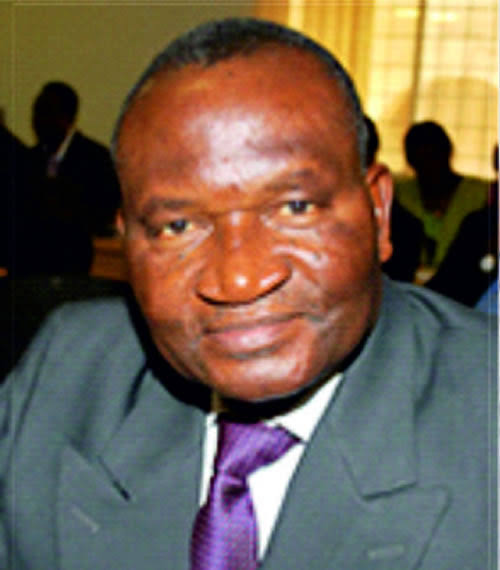
BY Pof Mike Ozekhome, SAN, CON, OFR
“Greatness is not measured by what a man or woman accomplishes, but by the opposition he or she has overcome to reach his goals.” -Dorothy Height
In my little way and from my very small window and little corner, I enjoy celebrating people – dead or alive,great or not so great. These are historic personalities who symbolise the words of Ralph Waldo Emerson: “Do not go where the path may lead; go instead where there is no path and leave a trail”.
There are names that echo through time, names that, when spoken, bring to mind the essence of who that person is and what he stands for. Chief Kanu Godwin Agabi, SAN, CON,is one such name. And if you did not know, “Agabi” itself carries a delightful metaphor in his native Bekwarra tongue. It simply means something sweet, awesome and utterly adorable. In the Holy Bible, Agabi means love and affection. He has yet another name which can frighten any gate-crasher. That is his first name, “Kanu”. Kamanu, Akanu or Kamalu is of Igbo origin shortened to Kanu. It simply refers to the traditional Igbo god of thunder and lightning. It is equivalent to the more familiar name of the same deity called Amadioha or Amadiora. In Sierra Leone, Kanu simply refers to “high god”, the supreme being and originator of all things who is said to live in the distant skies. But our own Kanu is not a supreme being. Thank God he lives amongst us here on earth, not in the distant skies. We are happy with this. Yes, the name fits him like a glove, because here is a man whose legacy is as sweet and affectionate, as it is monumental. But that is not all. In case you were to take his love, affection and sweetness for granted, you are stopped dead on your tracks by his middle name,Godwin. And he has won many battles and wars alike because his God always wins.His sweetness and affection easily translate into generosity.
I remember one of my many visits to Chief Agabi many years ago as if it were just yesterday. It was at his office in Mabushi, Abuja, a place that buzzed with the energy of legal brilliance. He had the kind of aura that simultaneously made you feel both at ease and in awe. Such apparent contradiction! Imagine my surprise when, during our conversation, he fished out and casually handed me an iPad. Now, you have to understand that this was a time when the iPad was still a very vague concept to many; a sleek piece of technology that felt then more like a futuristic dream than reality. It was my first time of beholding and touching an ipad. Yet, here was Chief Agabi, gifting me one as if it were as ordinary pen or handkerchief. It was my first iPad ever, and I carried it around for years like the treasure it was; not just because of its uniqueness then, but because of who gave it to me. Thank you sir.
“The only true wisdom is in knowing you know nothing.”- Socrates
That moment was quintessentially Agabi-generous, forward-thinking and always ahead of the curve. His generosity is not just about material gifts; it is in his wisdom, his deep pieces of advice and his uncanny ability to make you see the world a little differently from yours after every conversation with him.This is what I cherish most. And if you have ever had the pleasure of being in his company, you would discover that he is as witty as they come. He once told me, with a twinkle in his eye, that the only reason he became a lawyer was because his mother did not trust doctors! Of course, that may not have been completely correct,but it was vintage Agabi, SAN, a man who could blend humour with wisdom in a way that leaves you both laughing and thinking deeply.
But let us take a step back to where it all began. Born on the 9th of July, 1946, in the small village of Adim, in Odukpani Local Government Area of Cross River State, Nigeria, Chief Agabi’s beginnings were as humble as mine. Perhaps, mine was even more humbling. Yet, from these modest roots, a giant of the legal world would emerge.
“Start where you are. Use what you have. Do what you can.” – Arthur Ashe
Chief Agabi’s early education took him to St. John’s Primary School, Gboko, and later St. Benedict’s Primary School, Ogoja. These were simple schools in Southern Nigeria, but they were the fertile ground where his intellect first took root. From there, he moved on to Maryknoll Secondary School, Okuku, Osun State and Methodist College, Uzuakoli,Abia State. It was during these formative years that the young Kanu began to show signs of the greatness that would later come to define his life. He was not just a good student; he was a youthful leader, the kind of person who could inspire others with sharp vision and raw determination.
I imagine that even then, the young Agabi must have had the same twinkle in his eye that I saw when he handed me that iPad. It is the look of a man who knows he is destined for something extraordinary, even if the world hasn’t caught up to that fact yet.
In 1969, Chief Agabi took the next step on his journey of life by enrolling at the University of Lagos to study law; a decision that would set him on a course that would help shape the legal landscape of Nigeria. During his time at the university, he not only excelled academically, but also became a prominent figure in student union politics. As the President of the Ogoja Provincial Students Union, he demonstrated the leadership qualities that would later make him a respected figure in both the legal and political arenas of Nigeria.
“The law is reason, free from passion.” – Aristotle
After successfully completing his training at the Nigerian Law School in Lagos, Chief Agabi was called to the Nigerian Bar in 1972 ( I was then a form three secondary school student), becoming a Solicitor and Advocate of the Supreme Court of Nigeria. His early career was marked by an unwavering commitment to justice and a keen understanding of the lawyer’s role in society. It was not long before his talents blossomed, and he began to ascend the ranks of the legal profession.
As his reputation grew, so too did the responsibilities placed upon his slim shoulders. Chief Agabi served as Chairman of the Board of Directors of NICON, Niger Insurance Company Limited and National Properties Limited. His leadership in these roles was marked by a rare blend of wisdom and pragmatism, traits that would later serve him well in the years to come.
In 1997, in recognition of his immense contributions to the legal profession, Kanu Godwin Agabi was conferred with the prestigious rank of Senior Advocate of Nigeria (SAN). This was not just a title, but a testament to his excellence in the legal field, a recognition that he had not only achieved excellence by mastering the law, but had also become one of its foremost champions.
TWICE A GIANT
“In the middle of difficulty lies opportunity.” – Albert Einstein
Now, here is a tale that is as sweet as it is remarkable: Agabi was appointed Attorney General of the Federation and Minister of Justice not once, but twice! If that does not speak to his brilliance and resilience, I do not know what does. The first time was in 1999, under President Olusegun Obasanjo. This was a period when Nigeria was transitioning from military to civilian rule, a time fraught with challenges and uncertainties. It was the kind of moment that could make or break a nation’s legal framework. And who did they turn to? None other than Chief Kanu Agabi.
His first tenure as Attorney General was nothing short of transformative. One of his most notable achievements was his push for legal reforms. He understood, perhaps better than anyone else at that time that the law must evolve with the times if it was to serve the people effectively. He advocated for changes that would strengthen the judiciary and ensure that the rule of law was upheld across the nation.
“The best way to predict the future is to create it.” – Peter Drucker
One of the most courageous actions he took during this time was his call for a modification in the strict application of Sharia law in Nigeria. In March, 2002, he famously wrote to the governors of the northern states, urging them to ensure that Sharia law was applied in a way that did not discriminate against Muslims for being Muslims or violate the principles of equality before the law. He had made this statement against the backdrop of some judgements delivered under Sharia law that were brazenly discriminatory against Muslims. Notably, in one of the judgement, a lady, Amina Lawal, was sentenced to death by stoning for giving birth outside wedlock. This was no small feat, and it took a man of immense courage and conviction to take such a critical stand. He famously wrote thus, “A Muslim should not be subjected to a punishment more severe than would be imposed on other Nigerians for the same offence and equality before the law means that Muslims should not be discriminated against.”
Then he became Minister of Solid Minerals. While holding that second sensitive ministerial portfolio, it appeared as if the universe had not had enough of his sheer brilliance.Agabi was again reappointed Attorney General of the Federation and Minister of Justice in 2002, following the tragic assassination of Chief Bola Ige. This second appointment was a testament to the trust and confidence that the nation had in his abilities. And once again, he valiantly rose to the occasion, navigating the complex legal and political challenges of the time with the same grace and effectiveness that had marked his first tenure.
“Success is not final, failure is not fatal: It is the courage to continue that counts.” -Winston Churchill
His time as Attorney General was marked by several high-profile cases and legal battles, many of which tested the very fabric of Nigeria’s legal system. But in true Agabi fashion, he faced these challenges head-on, armed with nothing but his sharp mind, his intellect, deep sense of justice and, of course, that signature wit. In March 2002, Kanu wrote in a letter to Nigerian state governors that the application of strict Islamic or Sharia law was unconstitutional, since some judgments passed under Sharia discriminated against Muslims. That month, Amina Lawal, a young Nigerian woman accused of giving birth to a child out of wedlock was sentenced to death by stoning, a punishment that was confirmed in August 2002 by a Shari’ah court of appeals in Funtua, Katsina State. Kanu came under immense pressure from Amnesty International to abolish the death penalty in Nigeria.
In May,2003, the Attorney General urged a Federal High Court in Abuja to order the arrest of the National Assembly leadership, and to imprison them for contempt of the court. He appealed to the court to set aside the anti-graft bill which the National Assembly had passed into law despite a presidential veto.
Nigeria had not had enough of him as Obasanjo again appointed him Special Adviser on Ethics and Good Governance. At the 2005 National Political Reform Conference where I first met Agabi,I headed the drafting sub-committee that knocked together matters agreed upon by the Civil Society Committee. Agabi’s paper on ethics and morality was a magnum opus; a nullus secundus. It was a reservoir of knowledge about ethical resurgimento and renaissance. He made his points without being fussy, dictatorial or overbearing.
A LEGACY WOVEN IN SWEETNESS
“The legacy of heroes is the memory of a great name and the inheritance of a great example.”- Benjamin Disraeli.
If you ever wondered what it is like to leave a legacy that stands the test of time, just take a look at Kanu Agabi’s trajectory.His contributions to Nigeria’s legal and political landscape are like threads woven into the fabric of the nation’s history. But what makes his legacy truly sweet, pun intended, is the way he has touched the lives of so many, often in ways that go beyond the courtroom.
Take for example, his mentorship of young lawyers. Agabi did not just blaze a trail; he made sure that others could follow in his footsteps. He has mentored countless legal professionals, many of whom have gone on to become giants in their own right. And he did it not with an air of superiority, but with the humility and generosity that have always defined him. Humility? He wears it like a second skin.
“You make a living by what you get, but you make a life by what you give.”- Winston Churchill
And let us not forget his philanthropy. Remember the Trinity Towers in Abuja? That massive complex he built to house law firms, many of which operate rent-free? It is just one example of how Kanu Agabi, gives back to the society. He does it gladly. But here is the kicker; he did not just stop at providing office space; he makes sure that lunch is served free to everyone in the complex from Monday to Friday. The food is cooked in his Asokoro home and taken to his office at Mabushi, Abuja. Now, if that is not sweet, I do not know what is!
Chief Agabi’s generosity extends to education as well. He has funded scholarships, built schools and supported various educational initiatives, particularly in his home Ogoja region of Cross River State. His goal has always been to ensure that the next generation has the opportunities that he had,or better opportunities that he could only imagine or dream of as a young boy in Adim Village, but could not have.
“The function of education is to teach one to think intensively and to think critically. Intelligence plus characterthat is the goal of true education.”- Martin Luther King Jr.
But perhaps what I admire most about Chief Agabi is his unwavering belief in the importance of integrity in leadership. He once said, and I quote, “There is nothing wrong with our Constitution. Even if it is a broken-down vehicle, it is the vehicle that we have. However good the Constitution is, it is not a self-enforcing document; it requires good people to enforce it.” Truer words have never been spoken.
This belief in the power of the Constitution and the need for ethical leadership has been a guiding principle throughout his career. It is what has made him not just a great lawyer, but a great man. And it is why his legacy will continue to inspire long after we’re all gone. While I share Agabi’s beautiful espousement of the imperative of integrity in leadership, I humbly disagree with him (and we have done this countless times),on his stance that there is nothing wrong with the 1999 Constitution. Sir, everything is wrong with it. The fact of its being defacto does not make it dejure. It is an illegitimate document, a mere schedule attached to Decree No. 24 of 1999. It does not derive any legitimacy from the Nigerian people through a popular plebiscite or referendum such as to make it home-grown and autochthonous. His allegory of the broken-down vehicle is very apt here. When the knocked engine of a vehicle defies all repairs and solution, you discard it for a brand new serviceable vehicle,rather than continually pour water in a basket.Such is with our illegitimate (not illegal) Constitution. No referendum was carried out on the Constitution as the Midwest Region did on 10th August, 1963 to exit Western Region.Series of referendum have been carried out by many countries across the world to give their Constitutions legitimacy – Iran, Iraq, South Africa, Egypt, Tunisia, Algeria, Denmark, Switzerland, Indonesia, Singapore, Malaysia, Eritrea, Australia, Belgium, Brazil, Bulgaria, Canada, Austria, Chile, Columbia, Ethiopia, Germany, Greece, India, Italy, Iceland, Morocco, Namibia, Russia, Romania, Spain, Sudan, Sweden and Zimbabwe. The list is countless. That is the only way to go.Merely trimming the branches of a tree that cracks the wall of your house ( serial amendments of the Constitution) can not stop the cracks. They will widen. The solution is to uproot the entire tree,roots and branches. Nigeria needs a people-driven Constitution, owned by them and legitimised by them.
THE SWEETNESS OF JUSTICE
“Justice delayed is justice denied.” – William E. Gladstone
Kanu Agabi is a man who has spent his entire life ensuring that justice is not just a concept, but a reality for all Nigerians. His legal career, marked by numerous high-profile cases, has consistently demonstrated his commitment to fairness and equality before the law.
One of the most notable moments in his career was his defence of human rights during his tenure as Attorney General. He was a vocal advocate for civil liberties, and he made it clear that the government had a duty to protect the rights of its citizens. His work earned him respect both within Nigeria and on the international stage, where he was recognized as a champion of human rights.
“The arc of the moral universe is long, but it bends towards justice.” – Martin Luther King Jr.
His stance on legal reforms was not just about changing laws; it was about changing lives. He understood that the law must serve the people, and he was relentless in his pursuit of a legal system that was fair, just, and accessible to all. His efforts in promoting legal reforms, particularly in the area of human rights, have had a lasting impact on Nigeria’s legal landscape.
But Agabi’s legacy is not just about the cases he won or the reforms he championed. It is about the people he helped, the lives he touched and the example he set for future generations. He has shown us that the law can be a force for good, that it can be used to protect the vulnerable, to challenge the powerful, and to bring about meaningful change. Sapara Williams (“A lawyer lives for the direction of his people and the advancement of the cause of his country”); and Professor Dean Rosco Pound (“Law must serve as an instrument of social engineering”) must be very proud of Agabi from their cold graves.
THE SWEETNESS OF MEMORY
As I reflect on the life and legacy of Chief Kanu Agabi, SAN, I am reminded of the many ways in which he has shaped not just the legal profession, but the lives of those who have had the privilege of knowing him. Whether it is through his mentorship, his philanthropy, or his unwavering commitment to justice, Chief Agabi has left an indelible mark on the sands of time.
And for me, the memory of that day in his office when he handed me an iPad, my first iPad ever, will always be a reminder of his generosity, his forward-thinking nature and his ability to make everyone around him feel valued and appreciated.
“What you leave behind is not what is engraved in stone monuments, but what is woven into the lives of others.” – Pericles
Sir, I will never forget that early February,2024 encounter in your office when in the course of our discussion, you broke down and wept like a baby,just to push across a point to me. I got the point. And it changed a lot of things about my perception of life. I thank you sir.
“A great man is one who leaves others at a loss after he is gone.”- Paul Valery
Agabi is a man who will be remembered not just for what he achieved, but for how he achieved it. His legacy is one of sweetness of kindness, generosity and a commitment to making the world a better place than he met it. And in the end, that is the greatest legacy of all.Chief Agabi and I have clashed in many cases (both civil and criminal).And he has equally led me in many. In all these, he displayed uncommon humility and mentorship. Many a time he left me to handle the very sensitive cases because in his usual words, “Brother Mike, you are more than competent and capable to handle this case; my absence will mean nothing”. “Brother Mike”; yes,you heard me right. He does not just call me Mike,which he is eminently entitled to, but must add ” Brother”. Thank you sir for your confidence in me. Thank you for your humility.
So here is celebrating Chief Kanu Agabi, SAN, CON,a man whose names means sweetness and awe, and whose life has been a testament to the power of living with integrity, purpose, dignity and a deep love for humanity. His story is one that will be told for generations to come, and his legacy will continue to inspire long after we are all gone. This ode may have come a little late in celebrating your 78th birthday (9th July, 1946). But sir, please, forgive me, as you would always say in court whenever you want to enrapture judexes you appear before with your booming baritone voice . Forgive me sir.
Opinion
The Hypocrisy of Power Game Between The North and South: The Time To Talk Is Now
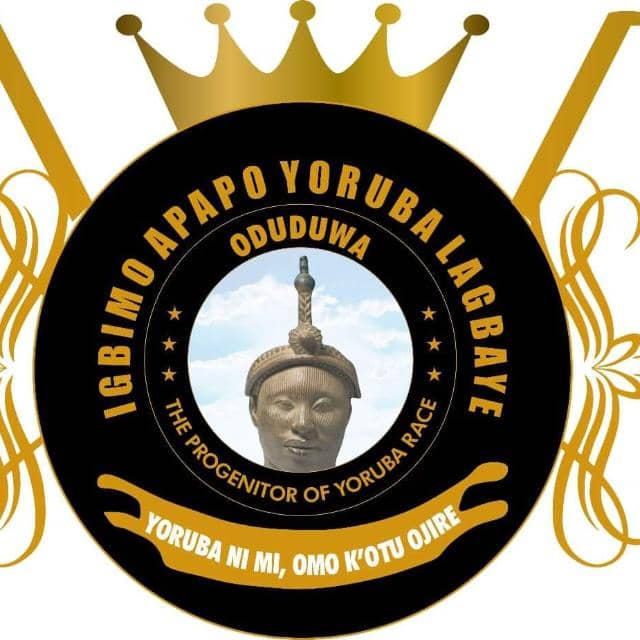
The leadership of the Yoruba Council Worldwide (Igbimo Apapo Yoruba Lagbaye); the apex umbrella body for all Yoruba indigenous people globally is highly concerned about the recent devastating effects of the Northern quests and aggressive desperation for power ahead of 2027 or through any other irrational means before the ripe of time.
We are seriously concerned to witness all manners of unprecedented barrage of fireworks of incendiary rhetoric issued from different Northern elites as emanated from Prof Ango Abdullahi of the Northern Elders Forum seeking to call for an end of Nigeria based on the 100 years expiration of 1914 treaty after 10 years which lapsed in 2014.
To Alhaji Rabiu Musa Kwankanso’s crudity, unverified lies and tale of discords against the South: “Lagos colonising the North”, was his biased statements!
Hence, we must expressly express our dismay and disappointed on such insensitive rhetoric and by that laconically detest such an unflattering statement from chieftain of the New Nigeria Peoples Party (NNPP), Senator Rabiu Musa Kwankwaso, for intentionally misinforming and misleading Nigerians about President Tinubu’s Tax Reform Bills before the National Assembly.
Sadly enough, Alhaji Kwankwaso’s comments while addressing students of Skyline University during their convocation in Kano recently, demonstrated either a lack of understanding of the tax reforms or a deliberate attempt to politicize President Tinubu’s positive visionary and Renewed Hope initiative.
It is evident that Senator Kwankwaso is still grappling with the fallout from his abysmal performance in the 2023 presidential elections. This lingering disappointment seems to have influenced his repeated reliance on divisive rhetoric and unfounded accusations against the administration of President Tinubu.
While the 19 Northern States Emirs and Governors provokingly demanded their Senators and Reps to reject, end and fight the present Administration of President Bola Ahmed Tinubu’s tax reforms bill to a halt, in which one of the arrowheads: Senator Ali Ndume said the “TAX REFORM Bill is Dead on Arrival.”
Rather than engaging in constructive national dialogue or offering meaningful contributions to national development, Kwankwaso, Ali Ndume and other co-travellers appears to have chosen a path aimed at inciting division between the North and the South, and casting aspersions on initiatives being painstakingly designed to benefit all Nigerians.
Such actions are not only unhelpful but also risk undermining the unity and progress of the country at a critical time when inclusive leadership and national cohesion are paramount to stability, progress and prosperity of our dear nation.
President Bola Ahmed Tinubu’s tax reforms are a necessary steps toward addressing the economic challenges facing the country and ensuring equitable development for all Nigerians, including those in the north especially the President’s initiative to tackle the disproportionate distribution of revenues from the Value Added Tax to all 36 states of the Federation and the FCT.
In strongest term we are not oblivion of the ongoing despicable threats bothering on excessive interference and high powered conspiracies to disrupt and hijack power from the South with the systemic and surreptitious renewed onslaught recruitment of the former President Olusegun Obasanjo as one of centrifugal forces being radically committed through his offensive and disparaging statements being deliberately orchid in running the current Administration down by all means possible.
Moreso, as reflective of his self styled selfish act and hatred for Constituted authority, his megalomaniac inclination and inordinate ambitions against President Bola Ahmed Tinubu led government, especially having lost power through his proxy kid Peter Obi via the ballot in 2023 Presidential election.
We hereby warn former President Olusegun Obasanjo to refrain from making statements that is capable of undermining Nigeria’s unity, peace and progress.
While we reiterate and assert our absolute confidence, that the country is functioning effectively under President Bola Tinubu led Federal Government, though with some surmountable challenges, still as they postulated, peace is what matters and not a all manner of provocative statements within the polity, because there will be light at the end of the tunnel, God’s willing.
To set the record straight, hence, it is necessary to respond and react appropriately to Chief Obasanjo’s recent keynote address at the Chinua Achebe Leadership Forum at Yale University in Connecticut, USA.
Wherein in his address, Baba Obasanjo criticised Nigeria’s leadership, describing the country as being a failed state of “state capture” and urging Nigerians to prioritise credible leadership for the Independent National Electoral Commission (INEC) to ensure electoral integrity.
Regrettably, former President Olusegun Obasanjo’s language of the war on peace time is a disaster and unpatriotic move in calling for anarchy, which is quite an anathema to the status of an elder statesman in his referential eldership.
The vituperation of Chief Olusegun Obasanjo’s lecture or better defined as tantrums Talk show, as the Chief harbinger of our worsening state of hunger and hardship was full of energy to condemn the current Administration with utter hatred of his avowed “do or die” mentality that has been infamously reputed to be offensive disappointing and disgusting as the only salvo that can be fired from a despotic and totalitarian personality only found to be hypocritically and deceitfully projected himself as a true democrat.
It was in record how he levelled the land of Odi with deadly precision and mortality even without any Justice till date, he removed Dariye and Fayose through illegitimate means of declaration of state of emergency all because he lacked the receptive mind for criticism and tolerance.
Now we must reiterate and state emphatically in admonishing the Northern elites to think twice on their incendiary staments and spiral bombardment of attacks through sponsored protests, media adverts or careless statements as well as the links such as: the #EndBadGovernance which started by some Northern youths, that was latter aggravated further and taken over by the #DayofRage led by thier proxies.
Unfortunately, this furtive and clandestine motivated underwater currents are largely engendered and orchestrated towards a obvious suspected Northern quest and desperation for power by all means ahead of 2027 Presidential elections.
How do we rate a situation wherein throughout the 8 years tenure of the former President Muhammadu Buhari, the entire Northern elites do not consider ending Nigeria treaty of 1914 only to wake up at the 99th hour of a Southwest Presidency to rage all manners of brimstone?
Hence, we warn in strongest term that this premeditated plan and well marshalled evil agendas to cause disunity, mayhem and strive among the citizens must be stopped once and for all for the betterment of our dear nation.
We vehemently frowned at the spurious and unverified lies, especially devastating propaganda actions targeted at the minds of their Northern kinsmen and women to hate and wish the President dead, this we unequivocally resist and condemned in its entirety.
This hypocrisy must stop now, wherein we lost lots of our brave minds to unbearable brazing manipulations and desperation in the past; Chief Obafemi Awolowo and MKO Abiola are proven records of similar antecedents of Northern hypocrisy and Power mongering.
It is hightime we talk truth to ourselves at a National Confab after each regional dialogue on the way forward, for if the North continuously hold the cliché of the “North are born to rule” ideology at the expense of the South, that means the rest of us are meant to be treated as their “slaves”, that are not safe in this country.
Have we for ones queried why the Northern Nigeria has more political advantages compared to their Southern counterparts: More state Governors and State House of Assembly members and Speakers, local government Chairmen and counsellors, Senators and House of Representatives members and more Federal institutions and employment opportunities and placements to mention a few.
This was why the Northern elites are eager to shut the tax reform bill down through their Northern Senators if the bill is brought for deliberation without having a concise dialogue with the rest of us.
If the Southern tax regime money is good to construct good roads and railway line to Maradi Republic of Niger, why now that the tax reform which is the best for the country is being campaigned against brutally, using legitimate means to commit illegality.
It is high time we are all captured into the ongoing comprehensive tax system, wherein both the citizens in the Northern and Southern parts are taxed eqaully , while the need to undermine this great efforts of President Bola Ahmed Tinubu is highly condemned.
We are bold to say that the need and quests for power must be done with absolute decorum and human face.
2027 election should not end in Ethnic wars and civil strives, we can discuss No Holdbar on all issues of our Nationality without hurting ourselves.
In conclusion, we would not tolerate any capture of Power through coup or any other means of manipulations, or whatsoever in causing instability.
We use this medium to commiserate with the families of the late Chief of Army Staff, Lt. General Taoreed Lagbaja, while as a matter of necessity we call for a detailed investigation into his cause of death and other surrounding circumstances, which calls for concern having witnessed recent threats of coup.
We implore President Bola Ahmed Tinubu to remain steadfastly committed and focused on ensuring good governance to the greatest benefits of greatest numbers.
We have emphatically and unapologetically spoken!
Signed:
Prince Isaac Aderemi Ajibola,National Publicity Secretary, Yoruba Council Worldwide.
yorubacouncilwordwide@gmail.com
Opinion
Is Okowa in a witch-hunt or scapegoat melodrama?
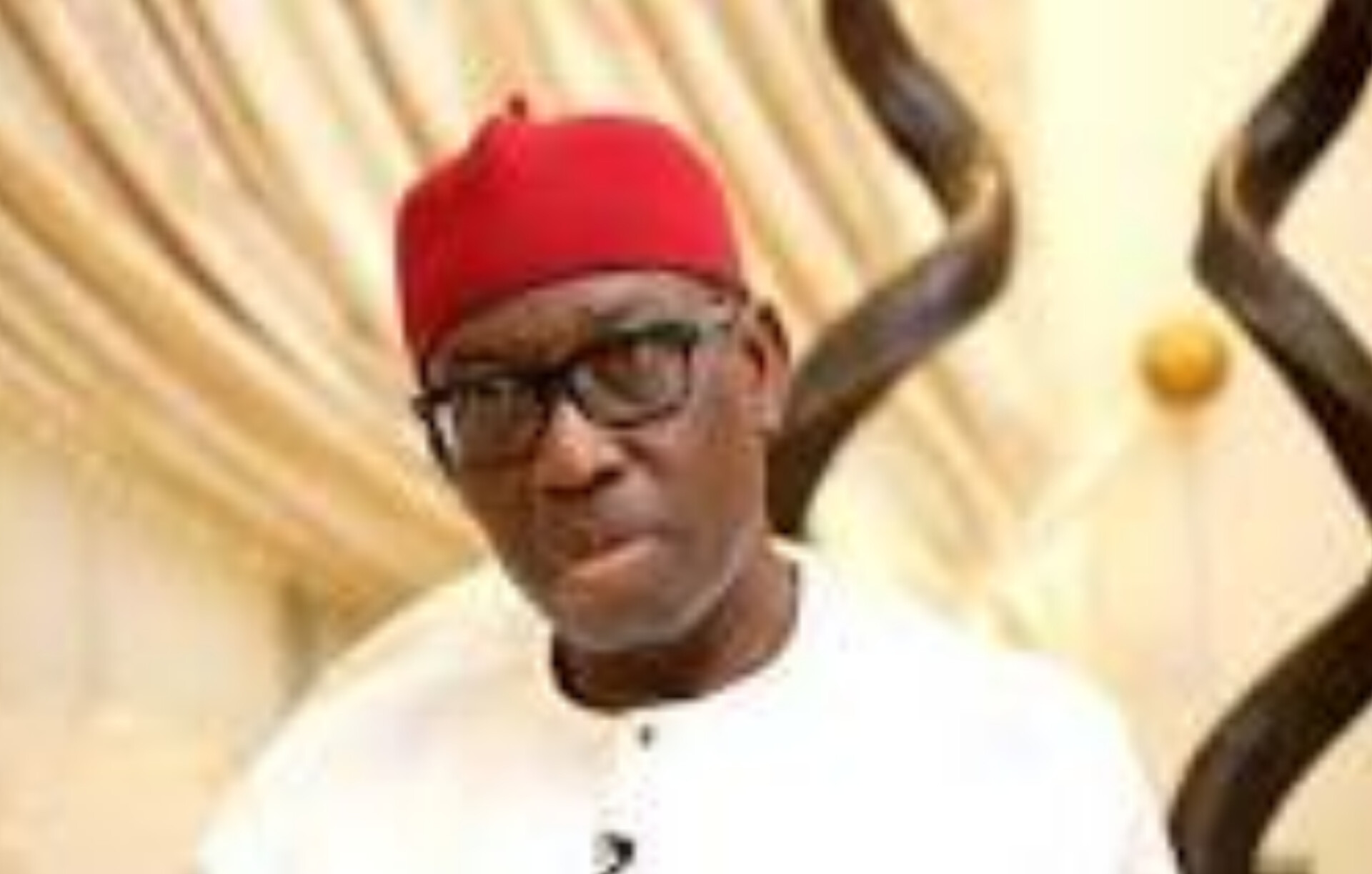
***EFCC perjures itself on Mambilla funds as it unleashes on Atiku’s Running Mate
By Alhaji Ajila Sarafa
The incredulous Economic and Financial Crimes Commission (EFCC) had already detained Mr Ifeanyi Okowa, for two days, over for “N1.3 trillion fraud” and there have been speculations about Okowa’s payments of “N100 billion”, “N40 billion”, N8 billion etc for this and that.
Mr Ifeanyi Okowa is a staunch PDP leader who was previously a Senator of the Federal Republic, a two-term former Delta State governor and was the Running Mate to the PDP Presidential Candidate, Alhaji Atiku Abubakar in the 2023 elections.
At a press conference on Thursday, 31 October 2024, the EFCC reeled out its achievements in prosecuting “former governors, ministers over N4.92 trillion fraud” and the “successful prosecution of four former governors and two former ministers over the past 12 months under the leadership of its Executive Chairman, Barr. Ola Olukoyede, mentioning high-profile personalities charged like former governors Yahaya Bello (APC) of Kogi State, Abdulfatah Ahmed (PDP) of Kwara State, Willie Obiano (APGA) of Anambra State, and Darius Ishaku (PDP) of Taraba State “for serious allegations involving billions in state funds”.
In what played out like a script of a melodrama to hunt down opposition peoples for real or phantom crimes as offenders or scapegoats or as sacrifices, the EFCC announced at a press conference that the “former Kogi Governor Bello faces charges related to over N190 billion, Ishaku of N27 billion, Ahmed for mismanagement of N10 billion, and Obiano for money laundering and theft of N4 billion.
EFCC also disclosed that it has also charged former ministers Saleh Mamman (APC) and Olu Agunloye (SDP) “for misappropriating funds from the Mambilla Hydroelectric Power Project of N33.8 billion and $6 billion respectively”.
Everyone should be worried about these crimes towering over N6.3 trillion being committed by less than a dozen men, whether or not they are in the opposition parties to the ruling party or in personal opposition to the current rulers of Nigeria. Are these people the only offenders? Or are these people those who have not heeded the call of one of the National Chairmen of the ruling Party who publicly said, “come to APC and your sins are forgiven”. The former PDP Vice Presidential Candidate, Sen. Okowa is the latest addition to the set of EFCC tagged “financial criminals,” so to say. Is Okowa being witch-hunted or is he liable? However, two things are clearly certain. First, not all the high-profile offenders in Nigeria are in the EFCC net, and second, not everyone in the EFCC net is a financial criminal.
Take the case of Agunloye who was arraigned in January 2024 by EFCC with charges of awarding the construction of the Mambilla Hydroelectric Project, estimated at $6 billion, as a Build, Operate and Transfer (BOT) contract in 2003 without any cash backing. He was also charged for “taking bribes of N3.6 million and N500,000 in August and October 2019 respectively for the 2003 contract award”. In fact, for the BOT model of contract, the Federal Government was not to pay to procure the contract. It was the contractor who was expected to invest his own funds to construct and operate the hydroelectric dam as well as sell the electricity therefrom at a predetermined rate for 35 years to recoup his investments and profits. Also, as a matter of fact, FGN never paid the contractor in 2003 and has not made any payment to the contractor till now. The big revelation is that EFCC, on the 31st of October 2024 at a widely covered Press Conference, confirmed that the Federal Government of Nigeria wrongly charged the former minister Agunloye when it disclosed that EFCC also “charged former ministers Saleh Mamman and Olu Agunloye for misappropriating funds from the Mambilla Hydroelectric Power Project of N33.8 billion and $6 billion respectively”. EFCC has now admitted that it is prosecuting Agunloye for misappropriating $6 billion which has never existed. What is that? Witch-hunting? Or scape-goating? Or sacrifice-making?
Alhaji Ajila Sarafa.
Opinion
Nigeria’s Brain Drain Conundrum: A Call To Action
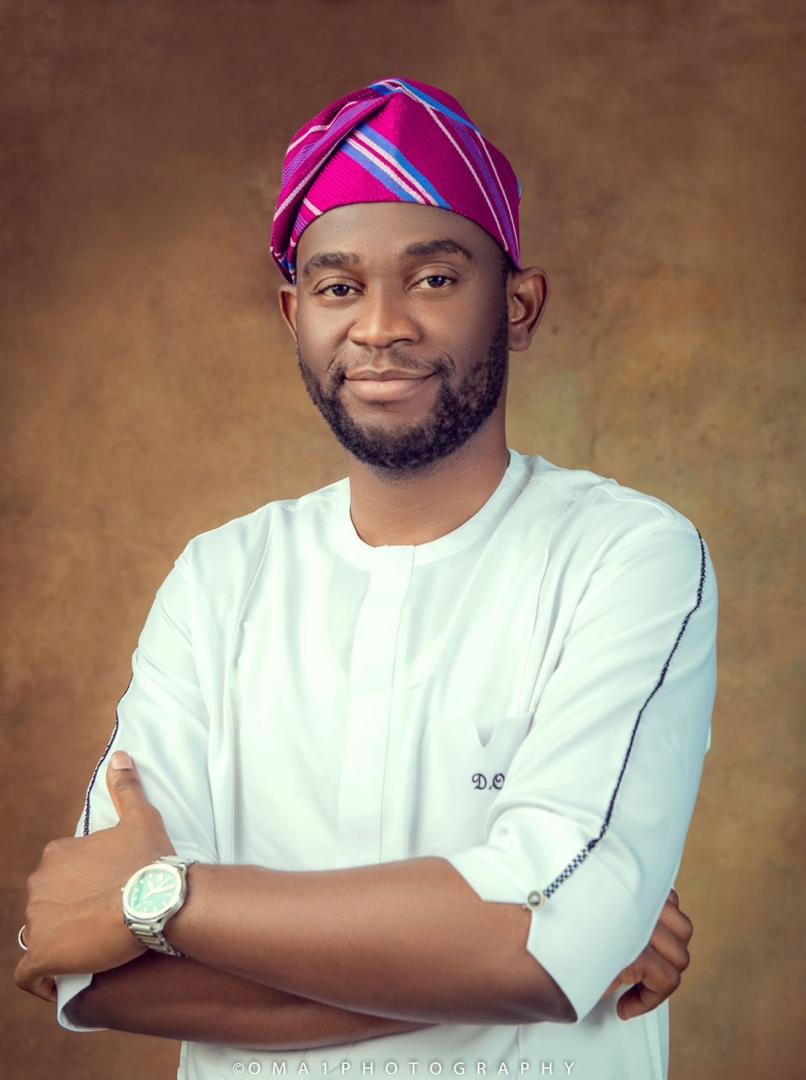
By David Osadolor
As we deal with the multiplex of our minds and call to heart the things that should be in the most definite ways, it is indeed beyond the questions of hope and endeavors. People are losing faith in the country and their attitudes are showing that. When an institution can no longer provide the basic things needed by its citizens, people lose faith. It is therefore okay in an absolute manner to understand that when dealing with our temperamental stars, habits, and attitudinal behavioral conducts would always hold the pillars of societal balance in relative terms. People are battered, tattered, and torn, both from dealings within their societal circles and the cycle of the national polity, and there is just no way to keep the magic light and lead the way if the habits formed from the system are not reformed to lead a successful life.
Beyond this, at the other side of this long table will be questions; aching hearts and searching eyes, and the solemn ideas of what exactly they are trying to be or where they can get to lead a better life. Amid these pains are people; hearts, and heads, and the numbers are constantly increasing as more questions are popping up from the distant shadows like silhouettes coming to life face to face with the cold realities of the entirely aching nation with no one willing to pick up the pieces. So here are the biggest catches; beyond the questions are questioners – people who have come along with a cumulative experience, adversity from childhood or something picked at adulthood. Most times, these people are often with value-laden and hurt-laden struggles which have shaped their current habits and the necessities of letting go are not so visible. This is the system. This has nothing to do with motivation or willpower, but the loss of faith in the institution and the necessity to find a better place to live and thrive.
Nigeria, Africa’s most populous nation and one of the continent’s largest economies, is often lauded for its abundant natural resources and rich cultural heritage. However, beneath this veneer lies a deeply troubling phenomenon – brain drain. The term “brain drain” refers to the emigration of highly skilled and educated individuals from one country to another in search of better opportunities. In Nigeria, this trend has reached alarming proportions, with thousands of professionals, particularly in the medical, academic, and technological sectors, leaving the country annually. This exodus has far-reaching consequences, not only for Nigeria’s economic development but also for its social stability and future growth prospects.
Let us remember therefore that in the past, our ancestors were forcibly taken to foreign lands in vast numbers, leaving behind only a few men, women, and children. This mass displacement, known as the trans-Atlantic slave trade, devastated our communities and stalled development, leaving our land barren. Many African scholars, such as Walter Rodney in his seminal work ‘How Europe Underdeveloped Africa’ (1972), argue that the slave trade significantly hindered the development of the continent, which was rich in both human and natural resources.
Unlike the forced migration of the past, this modern exodus is voluntary, driven by the search for better opportunities outside the shore of Nigeria. This migration manifests in two primary ways. First, there is the Brain Drain, where educated Nigerians leave the country to practice their skills elsewhere due to the lack of favourable conditions at home. Second, there is the broader migration of individuals seeking greener pastures, even when they may not have significant contributions to offer in their destination countries.
The lack of opportunities for many talented Nigerians has led to a significant diaspora across Europe and America. The country’s failure to provide an environment where its citizens can fully realise their potential has exacerbated the challenges of brain drain and migration, contributing to Nigeria’s ongoing development struggles. Our universities have suffered from poor government policies, leading to a decline in quality and prestige. Studying abroad, even in neighbouring countries like Ghana and Benin Republic, has become a status symbol. In the medical field, a significant number of Nigerian doctors and nurses now practice in the United Kingdom, while our political leaders, unable or unwilling to fix the healthcare system at home, seek medical treatment abroad.
As the country struggles to address its myriad challenges, the loss of its brightest minds creates a conundrum – a complex and persistent problem that seems almost impossible to solve.
The Root Causes of Brain Drain in Nigeria
One of the primary drivers of brain drain in Nigeria is the country’s deteriorating economic conditions. Despite being one of the largest oil producers in the world, Nigeria has been unable to translate its natural wealth into broad-based prosperity. High unemployment rates, inflation, and a volatile currency have created an environment where many professionals see no viable future for themselves and their families. For instance, a 2020 report by the World Bank indicated that nearly 40 per cent of Nigeria’s population lived below the poverty line, and this figure has likely worsened due to the impact of the COVID-19 pandemic. In such an environment, the allure of higher-paying jobs, better living conditions, and more stable economies abroad is irresistible.
A second major cause of brain drain is the inadequate state of infrastructure and public services in Nigeria. Healthcare, education, and power supply are critical sectors that have suffered from years of neglect, under-funding, and corruption. The healthcare sector, for example, is in a state of crisis, with many hospitals lacking basic equipment and supplies. This has prompted a mass exodus of medical professionals, particularly doctors and nurses, to countries where they can work in better conditions. According to the Nigerian Medical Association (NMA), as of 2021, about 10,000 Nigerian doctors were practicing in the United States alone, with thousands more in the United Kingdom, Canada, and other countries. The education sector is similarly beleaguered, with universities frequently shutting down due to strikes, poor funding, and inadequate facilities, driving academics to seek opportunities abroad.
A third factor contributing to brain drain is the pervasive insecurity in Nigeria. The country has been grappling with various forms of violence, including terrorism, banditry, and communal conflicts, for over a decade. The rise of Boko Haram in the northeast, the persistent clashes between herders and farmers in the middle belt, and the kidnappings for ransom that plague various parts of the country have made Nigeria an increasingly dangerous place to live and work. Many professionals, especially those with young families, feel compelled to leave the country for safer environments. The tragic abduction of over 270 schoolgirls in Chibok in 2014 and the regular reports of attacks on schools, churches, and villages, highlight the extent of the insecurity. In response, many Nigerians have sought asylum or emigrated to countries where they feel their safety is assured.
Lastly, the lack of good governance and political stability in Nigeria is a significant catalyst for brain drain. Corruption, nepotism, and a lack of accountability have eroded public trust in government institutions and stymied efforts to improve the country’s socio-economic conditions. The failure to hold credible elections, ensure the rule of law, and protect human rights has driven many Nigerians to seek a better life elsewhere. For example, the End SARS protests of 2020, which began as a call to end police brutality, quickly morphed into a broader movement against bad governance. The government’s heavy-handed response, including the infamous Lekki Toll Gate shooting, reinforced the perception that the Nigerian state is not only incapable of protecting its citizens but is also complicit in their suffering. This has further fueled the desire among many Nigerians, particularly the youth, to emigrate.
Consequences of Brain Drain on Nigeria’s Development
The mass exodus of skilled professionals from Nigeria has severe consequences for the country’s development. One of the most immediate and visible impacts is the decline in the quality of public services. In the healthcare sector, the departure of doctors, nurses, and other medical professionals has left many hospitals understaffed and unable to provide adequate care to patients. According to the World Health Organization (WHO), Nigeria has a doctor-to-patient ratio of 1:2,500, far below the recommended ratio of 1:600. This shortage has led to increased mortality rates, particularly for preventable and treatable conditions. Similarly, the loss of educators and researchers has diminished the quality of education in Nigeria, with many universities struggling to maintain academic standards. This has created a vicious cycle, as the decline in educational quality drives more students and academics to seek opportunities abroad, further exacerbating the brain drain.
Another consequence of brain drain is the loss of potential economic growth. Skilled professionals are critical to driving innovation, increasing productivity, and improving competitiveness in the global economy. When these individuals leave Nigeria, they take with them not only their skills and knowledge but also their potential to contribute to the country’s economic development. The technology sector, for example, has seen a significant outflow of talent, with many Nigerian tech entrepreneurs and engineers relocating to Silicon Valley, Europe, or Asia. This has deprived Nigeria of the opportunity to build a robust and dynamic technology industry that could create jobs, attract investment, and drive economic diversification. Instead, Nigeria remains heavily reliant on oil exports, which are subject to global price fluctuations and offer little in terms of sustainable development.
Brain drain also has significant social and cultural implications for Nigeria. The departure of educated and skilled individuals has created a vacuum in leadership and expertise within communities, weakening the social fabric and undermining efforts to address local challenges. For instance, in many rural areas, the absence of doctors and teachers has left entire communities without access to basic health care and education, perpetuating cycles of poverty and underdevelopment. Moreover, the loss of cultural and intellectual capital has led to a decline in the vibrancy of Nigeria’s cultural and academic institutions. Many Nigerian authors, artists, and intellectuals have relocated abroad, where they can find greater support and appreciation for their work. This has diminished Nigeria’s cultural influence on the global stage and reduced the diversity of voices contributing to the country’s national discourse.
Furthermore, brain drain exacerbates the inequality and social divisions that already plague Nigerian society. The professionals who emigrate are often those with the resources, connections, and education to do so, leaving behind a population that is increasingly divided along economic and social lines. This growing inequality fuels resentment and discontent, particularly among the youth, who see fewer opportunities for social mobility and personal advancement. The increasing gap between the “haves” who can afford to leave and the “have-nots” who are left behind, contributes to social tensions and undermines national unity. This division is further deepened by the remittances sent by those who have emigrated, which, while providing a vital source of income for many families, also create dependencies and distort local economies.
Real-Life Examples of Brain Drain and Its Impact
Several real-life examples illustrate the devastating impact of brain drain on Nigeria. One of the most poignant cases is that of the medical sector. In 2021, it was reported that over 80 per cent of the doctors who graduated from Nigerian medical schools in the last decade had left the country. This exodus has left many hospitals in Nigeria, particularly in rural areas, without enough qualified personnel to treat patients. The COVID-19 pandemic further exposed the vulnerabilities of Nigeria’s healthcare system, as the shortage of medical professionals hampered the country’s response to the crisis. In contrast, Nigerian doctors abroad have been making significant contributions to healthcare systems in the United States, the United Kingdom, and other countries, highlighting the loss to Nigeria’s own system.
In the academic sector, the story of Professor Olufunmilayo Olopade, a renowned Nigerian-born oncologist and geneticist, is a telling example. After completing her medical training in Nigeria, she moved to the United States, where she became a leading researcher in cancer genetics and personalized medicine. Her work has had a significant impact on the treatment of breast cancer, particularly in women of African descent. While her achievements are a source of pride for Nigeria, they also underscore the loss of talent that could have contributed to the development of medical research and education within the country.
The technology sector provides another striking example of brain drain. Iyinoluwa Aboyeji, a Nigerian entrepreneur, co-founded Andela, a company that trains software developers in Africa and connects them with global tech companies. Despite the success of Andela, Aboyeji eventually left Nigeria for Canada, citing the challenging business environment and the lack of support for entrepreneurs in Nigeria. His departure, along with that of many other tech innovators, highlights the obstacles that prevent Nigeria from fully capitalising on its talent pool.
Finally, the story of Chimamanda Ngozi Adichie, one of Nigeria’s most celebrated authors, reflects the cultural impact of brain drain. Although Adichie has gained international acclaim for her novels and essays, much of her work has been produced while living abroad. Her decision to leave Nigeria was driven in part by the limited opportunities for writers and intellectuals within the country. While she continues to engage with Nigerian issues through her writing, her physical absence from the country represents a loss of cultural and intellectual leadership that could have contributed to Nigeria’s literary and artistic development.
Potential Solutions and the Role of Policymakers
Addressing the issue of brain drain in Nigeria requires a multifaceted approach that tackles both the push and pull factors driving emigration. Policymakers must first focus on improving the economic conditions within the country. This involves creating an enabling environment for businesses, reducing unemployment, and ensuring that wages are competitive with those in other countries. Economic reforms should also include measures to stabilize the currency, control inflation, and attract foreign investment. By improving the economic prospects within Nigeria, the government can make staying in the country a more attractive option for professionals.
Investing in infrastructure and public services is another critical step. The government must prioritise the healthcare, education, and power sectors, ensuring that they are adequately funded and managed. This includes upgrading hospitals and schools, providing continuous training for professionals, and ensuring that essential services such as electricity and clean water are consistently available. By improving the quality of life in Nigeria, the government can reduce the incentive for skilled professionals to seek better conditions abroad.
Addressing insecurity is also paramount. The government must take decisive action to restore peace and stability in all parts of the country. This requires not only military interventions but also efforts to address the root causes of violence, such as poverty, inequality, and social exclusion. Additionally, the government should work to strengthen the rule of law, protect human rights, and ensure that all citizens feel safe and secure within the country. By creating a safer environment, the government can encourage professionals to stay in Nigeria rather than seeking refuge in other countries.
Finally, improving governance and political stability is essential to reversing brain drain. The government must demonstrate a commitment to transparency, accountability, and the rule of law. This includes holding credible elections, combating corruption, and ensuring that public officials are held accountable for their actions. By restoring public trust in government institutions, the government can create a sense of hope and confidence in the future of Nigeria, making it less likely that professionals will want to leave the country.
Conclusion
Nigeria’s brain drain crisis represents a formidable challenge, but it is not insurmountable. The country is blessed with an abundance of human talent, but unless it takes urgent action to address the factors driving emigration, it risks losing this valuable resource to other nations. The consequences of brain drain are already being felt across various sectors, from healthcare and education to technology and culture, and these impacts will only deepen if the trend is not reversed. Policymakers must recognise that addressing brain drain is not just about retaining talent; it is about creating a nation where professionals can thrive and contribute to the development of their country. It is about building a Nigeria that offers not just hope, but tangible opportunities for all its citizens.
The call to action is clear: Nigeria’s leaders must prioritize the welfare of their people by creating an environment that fosters growth, innovation, and security. They must invest in the country’s infrastructure, improve governance, and address the economic and social challenges that drive brain drain. By doing so, they can ensure that Nigeria’s best and brightest are not just celebrated abroad but are empowered to build a brighter future at home. The time for action is now; the future of Nigeria depends on it.
***Osadolor, the President,
Nigerian Young Professionals’ Forum (NYPF) writes from Abuja
END
-

 Crime8 months ago
Crime8 months agoNemesis catches up with sex-for-grade Lecturer at FUL in Kogi
-
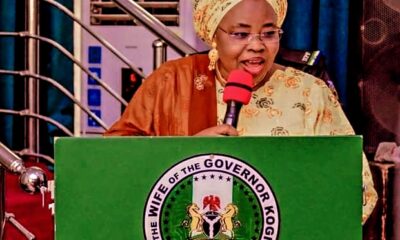
 Newsbite Woman7 months ago
Newsbite Woman7 months agoAt International Day of Families Kogi Governor’s wife harps on sustainable rnvironmental habits
-
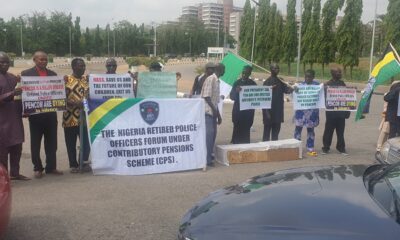
 Metro Section7 months ago
Metro Section7 months agoPolice retirees storm N’Assembly, protest over unpaid Pensions
-
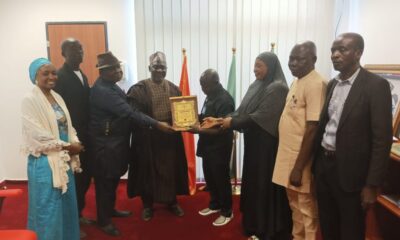
 Senate7 months ago
Senate7 months agoSenator Echocho honored by Kogi East NASS workers
-
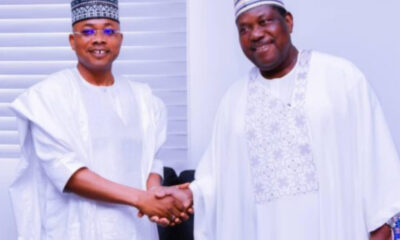
 Appointment8 months ago
Appointment8 months agoSGF Akume lauds Ododo for superlative performance in 100 days
-

 National8 months ago
National8 months agoActivist teases Timubu for deceiving Nigerians over strengthening of the Naira
-

 Crime8 months ago
Crime8 months agoTragedy as gunmen kill FIRS Staff, Khalid Bichi in Maitama
-
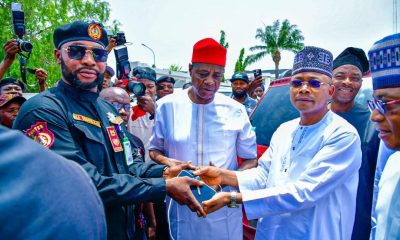
 Metro Section9 months ago
Metro Section9 months agoInsecurity: Ododo Unveils Metropolitan Quick Response Squad
